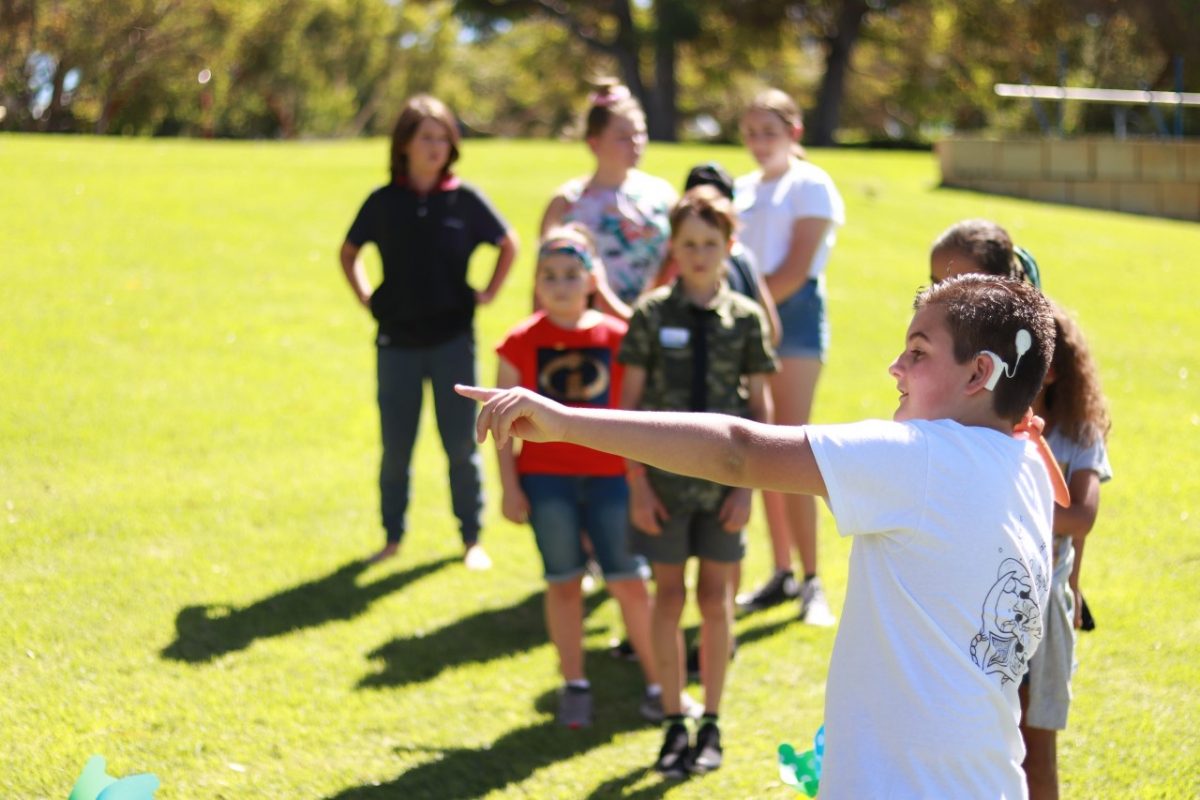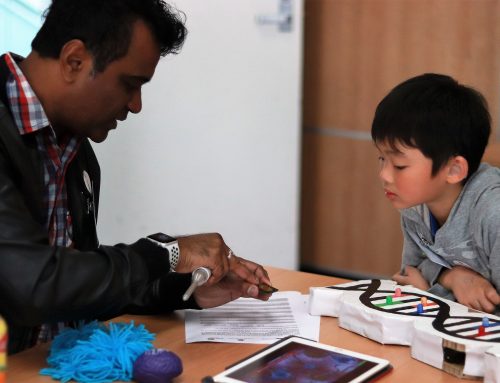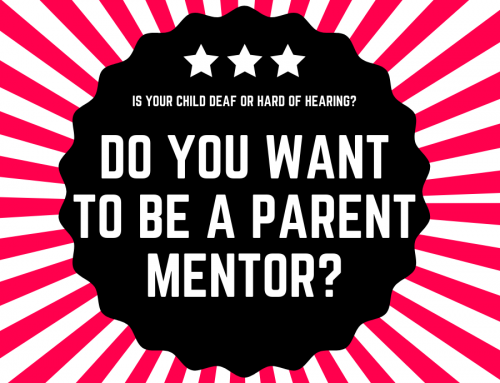Everyone experiences a wide range of emotions every day. It is important for children to learn how to recognise, label and manage their own emotions. This in turn allows children to understand other people’s feelings and respond appropriately to them. The following information may help you talk to your child about emotions and managing them.
Key messages
→ It is important for children to learn how to recognise, label and manage their own emotions.
→ Sometimes your child may experience some difficult and unpleasant emotions. You can help your child to find strategies and techniques to manage these emotions and to feel better.
→ Children who are Deaf or hard of hearing may experience higher levels of anxiety than other students. Parents and children can work together to manage anxiety.
Talking to your children about emotions
Everyone has feelings and emotions – it is part of being human. All good and bad feelings are normal. There are feelings which can be more difficult to deal with than others. This is when we need to talk to someone and get some help to feel better. It can be hard to tell someone that we’re feeling sad, worried, or upset, but talking about our feelings is important. Talking to someone who cares about you will help you to start feeling better. It helps to express the way we feel, although we may not always feel better immediately. The person we talk to can help us find ways to deal with these feelings.
Here are some emotions you could discuss with your child.
| Sad | Jealous | Confused | Cheerful |
| Happy | Joyful | Worried | Lonely |
| Surprised | Annoyed | Scared | Loving |
| Frightened | Excited | Bored | Embarrassed |
| Angry | Tired | Grumpy | Guilty |
| Anxious | Proud | Nervous | Shy |
Dealing with difficult or unpleasant emotions
Sometimes your child may experience some difficult and unpleasant emotions such as frustration, loneliness, anger, anxiety, sadness or embarrassment. You can help your child to find strategies and techniques to manage these emotions and to feel better. There will be
times when we experience mixed emotions, and this is normal. We can learn to manage a negative or unpleasant feeling It can be difficult to recognise when our feelings are becoming out of control. Some of the signs include;
→ talking louder
→ going red in the face
→ clenching our jaw and fists
→ feeling your heart racing
→ lashing out at others
It is important we don’t let these feelings make us do or say things that we do not intend to.
Here are some ways to help us to calm down and manage our emotions:
Emotional management
Name it: What am I feeling?
Explain it: Why am I feeling it?
Accept it: It is okay to feel this way.
Manage it: What can I do to deal with this situation?
Name it: Identify and understand the emotion.
Explain it: Think about what you are feeling and why you might be feeling this way.
Accept it: It helps to be kind and understanding to ourselves for the way we feel. It’s OK to feel what we feel, when we know the feelings are reasonable. This helps us accept our emotions and not blame others or judge ourselves for how we feel. It’s not helpful to think how we feel is someone else’s fault. It is also not good to think “It’s not fair that I feel this way I am going to speak angrily”.
Manage it: The goal is always to recognise and accept your feelings are happening without losing control.
Adapted from Friendly Schools Plus teacher resources
Self-talk: Our thinking determines our feelings
You can support your child to reflect on his/her thought patterns to understand what is causing feelings. Thought patterns are often referred to as self-talk.
A lot of people think problems and situations cause their feelings. What we say to ourselves (self-talk) in the situation is an important step. By recognising the self-talk that is prompting your anger, you can change your ways of thinking which will help you control your anger.
We learn self-talk through practice, like speaking a language or playing a sport. We can learn and practise new thinking patterns like new habits.
Unhelpful or negative thoughts
When we are in a challenging or difficult situation, sometimes we tell ourselves helpful things and sometimes we tell ourselves things that are not helpful.
Challenge > Thoughts > Feelings?
Our thoughts can be unhelpful, and we call this negative self-talk (e.g. I’ll always be bad at …; I can’t do anything right).
Getting rid of unhelpful thoughts
We can replace our unhelpful thoughts with more helpful thoughts. Ask your child to think of a time when they have been in a difficult situation and felt a strong or unpleasant emotion. Otherwise, you can use this example.
i.e. I was frustrated because we were playing a class game of indoor hockey and it was noisy
and I couldn’t hear the whistle or the instructions. At one stage I kept playing on when
everyone had stopped and everyone laughed. The teacher said he would use a flag and the
whistle for his umpiring calls next time and that would really help get my attention. But I was
embarrassed.
1. Ask them to consider what they might think if they experienced this situation (positive or negative).
2. Then ask them to think about how these thoughts might make them feel.
To identify unhelpful thoughts, ask you child to consider each of their thoughts.
→ Is this thought helpful?
→ Is this the whole truth?
→ Is there another way of looking at the situation?
Once you are able to recognise negative self-talk (unhelpful thoughts), then you can challenge them.
Challenging unhelpful thoughts
You can choose to have unhelpful thoughts or replace these with helpful positive thoughts. Replacing unhelpful thoughts with helpful or positive thoughts helps you to feel better and focus on positive solutions for next time.
For example:
| Feel not so good | Feel good |
| I feel miserable because I am useless | I am pretty good at this game, I scored two goals for my team. The flag will help get my attention so that I can see when the whistle has been blown |
| I feel worried nobody likes me | Just because they laughed at me it doesn’t mean they don’t like me. It probably did look funny, with me continuing to play when everyone else stopped |
| I feel scared everyone will laugh at me again | I don’t need to worry about people laughing, we all do embarrassing things sometimes |
| I feel angry because the game isn’t fair for me | I think I did pretty well at this game considering the noise and that I missed out hearing some of the things that were going on |
Think about it
• When your child expresses negative thoughts about themselves how do you respond; could you think through some more helpful responses to model positive self-talk?
• Do you make an effort to model positive thinking and self-talk for your child to copy?
Adapted from STARS- Straight talking about self-esteem, Erin Erceg, Clare Roberts Curtin University
Helping you child to talk about emotions
Everyone feels sad sometimes. Sharing your feelings with someone you trust can give you support and even ideas for actions to help get your feelings under control. Ask your child – What are some things you could do to help yourself to feel better?
Examples:
→ Talk to your family or a teacher at school
→ Talk to a friend
→ Spend time with a friend to take your mind off things or to talk about your feelings
→ Do something you enjoy like reading or playing sport
Dealing with anxiety
Feeling anxious for short periods of time is normal and experienced by everyone at some point in their life. Anxiety is an unpleasant feeling that people can have when they are faced with challenges or situations they are worried about. Difficulty managing anxiety is one of the most common mental health issues affecting children, and children who are Deaf or hard of hearing are more likely to experience anxiety than their typically hearing peers.
(Hancock, et al., 2017).
Children can experience different types of anxiety including:
→ Separation anxiety: Worrying that something bad will happen to parents and finding it difficult to be away from them;
→ Social anxiety: Worrying about what others think of them, extreme shyness, avoiding social interactions like going to parties, asking someone for help or speaking in front of the class at school;
→ Generalised anxiety: Worrying about daily matters such as being on time, school work, family and world events;
→ Obsessive compulsive anxiety: Continuous repetition of actions and thoughts to stop feeling bad; and
→ Post traumatic fears: Experiencing distress, feeling scared and having nightmares following a traumatic event.
Tips for helping your child with anxiety
→ Find out more about anxiety and talk with your child about it – the information provided on websites in the Where to get support section on this page can help to get you started.
→ Let your child know you can work together to overcome anxiety.
→ Teach them relaxation techniques such as breathing, meditation, muscle relaxation.
→ Help your child to manage their anxiety by setting daily goals.
→ Give them positive feedback by pointing out their strengths and letting them know they’re loved.
→ Put any setbacks into perspective – give them space to feel upset but also encourage them to not give up.
→ Encourage your child to have a healthy lifestyle by eating well, exercising and getting enough sleep.
Adapted from https://kidshelpline.com.au/parents/issues/social-anxiety-kids-and-teens and https://kidshelpline.com.au/parents/issues/anxiety-kids-and-teens
Help your child to understand that being anxious about new things or other things we are worried about is normal. Sometimes we have bad days when things just seem to be going wrong and this can make us feel really anxious. This video explores the signs your child might have an anxiety disorder and what you can do to help them manage it.
Telethon Kids Institute Video – Children’s anxiety: 3 ways to help your anxious child
How to tell if your child’s anxiety is normal
Some questions you can ask yourself to help tell if your child’s anxiety is normal include:
→ Is my child’s anxiety stopping them from doing things they want to be able to do or interfering with their friendships, schoolwork or family life?
→ Are the fears and worries experienced by my child different to most other children of the same age?
→ Is my child often extremely distressed and hard to settle, and is this interfering with theirs and your family’s routine?
Answering yes to these questions could mean your child is experiencing high levels of anxiety. If your child is feeling worried a lot and their anxiety is stopping them from doing the things that they want to do, it is important to consider seeking professional help. There a range of treatment options available to help you and your child manage and overcome their anxiety.
Where to get support
→ Telethon Speech and Hearing and the School of Special Educational Needs: Sensory have psychologists who can provide you and your child with support about anxiety
→ Your child’s school psychologist
→ Your child’s doctor or paediatrician
→ Your local children’s health or community health centre
Resources for parents
Beyond Blue: https://www.youthbeyondblue.com/understand-what’s-going-on/anxiety
Kids Helpline: https://kidshelpline.com.au/parents/issues/anxiety-kids-and-teens
Parenting Strategies: Protecting your child’s mental health: www.parentingstrategies.net
Raising Children Network: http://raisingchildren.net.au/articles/anxiety_and_fears.html/context/1516
Reach Out: https://au.reachout.com/articles/7-tips-to-help-with-stress-and-anxiety
“The West Australian Foundation for Deaf Children recognises Telethon Kids Institute, Telethon Speech and Hearing and School of Special Education Needs: Sensory for their work on the Telethon Belong Project and production of these Belong Resources.”






